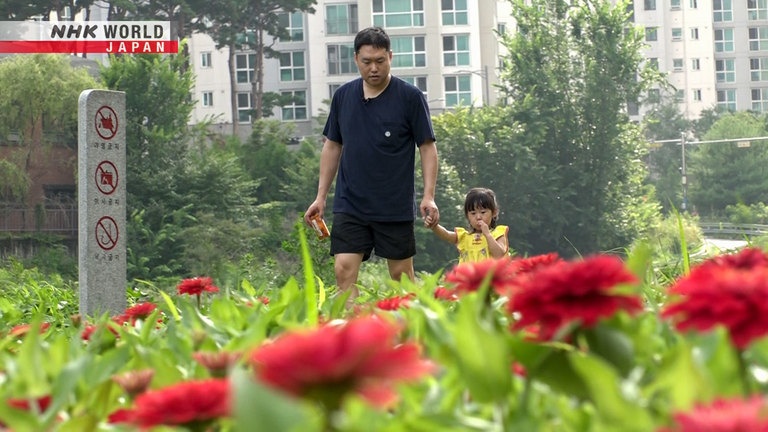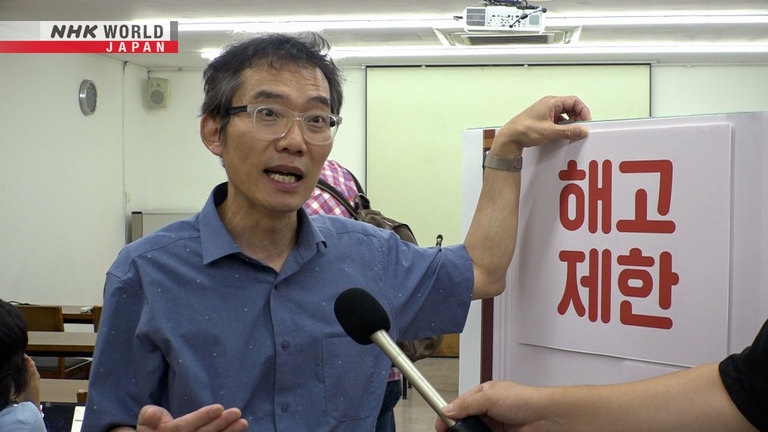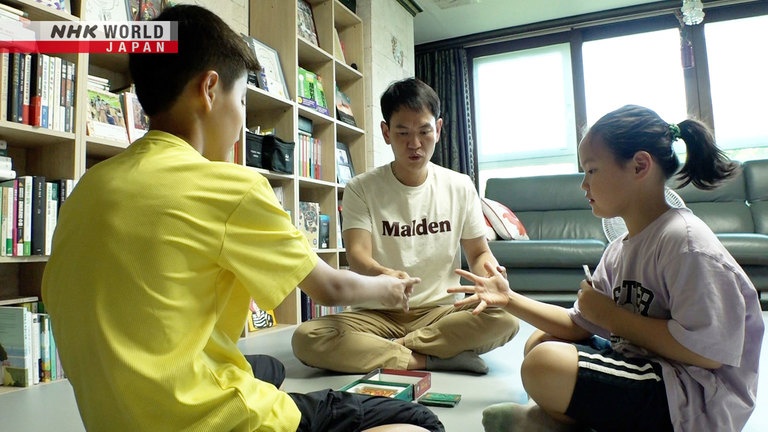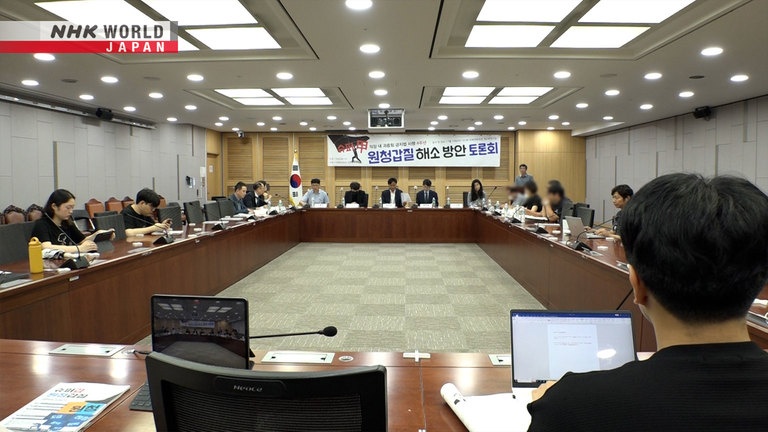Recognition for Paternity Leave: South Korea
To combat a declining fertility rate, in recent years the government of South Korea has offered increased financial aid to parents who apply for leave from work. Although guaranteed paternity leave by law, many fathers discover that upon returning to work, they face overt harassment such as lack of promotions, or more subtle interference. In response, support groups aspire to create a legal framework that protects working fathers, and to change society's perception of them.




Transcript
In July 2023, a symposium on population issues was held in the South Korean capital of Seoul.
South Korea is expected to be the world's first
country to disappear due to low birth rates.
In 2022, South Korea's total fertility rate stood at 0.78, the lowest among the 38 OECD nations.
As a way to combat the low birth rate, the government is encouraging men to play a bigger role in childrearing.
One new program started in 2022, in which married couples receive more funding if both parents take parental leave.
The government hopes that increased male involvement in parenting will encourage women to marry and bear children.
Many people in South Korea still believe
that child-rearing is a woman's job.
If my company allows,
I'd like to take paternity leave.
The number of men taking paternity leave has more than doubled in the past five years.
Despite these numbers, workers have voiced many concerns to worker-support organizations.
Many complain that they suffered
disadvantages for taking paternity leave.
One man recounted returning to work after paternity leave,
but being denied work for two months. Later, he was fired.
Working fathers in South Korea now face an uphill battle for recognition.
This episode highlights their struggles.
Anyang City, in Gyeonggi Province, is a quiet suburb outside Seoul.
We met with a man who's currently on paternity leave.
This is Oh Se-sung.
His daughter, Da-in, is two years old.
What's wrong?
Oh has taken a one-year paternity leave beginning in April 2023.
His wife also started her maternity leave in July.
Today, she heads out on an errand.
I'm off.
See you.
Oh is looking after his daughter alone today.
Is it hot, Da-in?
Is it okay?
He's gotten the hang of braiding her hair.
I've done this so many times,
though I can't do anything complicated.
Three months into his paternity leave, Oh began to notice the small changes in his daughter as they spend many hours together.
I used to help her wash her hands.
But last week, she said
she wanted to do it herself.
She's acting more independent.
My daughter has been acting happier
since I took paternity leave.
Recently, she was smiling a lot,
and I asked her why.
She said "I'm happy being with
Mommy and Daddy."
Oh's family is dependent on parental leave benefits from the government and employers.
We can apply for government funding
from our phones.
Since the paid parental leave system began in 2001,
the South Korean government has been gradually increasing the allowance.
Currently, each parent gets up to 1,100 dollars per month of leave.
But Oh says that's not enough when considering the recent inflation.
Our income has declined during parental leave.
But our living expenses don't change.
We end up in the red.
Oh works as a journalist.
He's been covering real estate news for nine years at a Seoul-based newspaper company.
Before taking paternity leave, he also wrote articles on child-rearing.
One of his series was titled, "Oh Se-sung's Playing With Dad."
"Oh Se-sung's Playing With Dad."
The 30-part series on parenting difficulties and tips proved very popular with readers.
"I didn't realize powdered milk is so expensive."
"I can't go to the hospital even if my child is sick."
Having gained knowledge on parenting through his work, Oh finally decided to take his own paternity leave.
He was the first male employee at his company to apply for the leave.
I was the guinea pig, so to speak,
and it got attention at work.
Friends asked if my company allows that.
They were concerned.
This is an article he wrote at the time.
"Apparently, you get fired if you take parental leave..."
Oh soon became very concerned about labor issues faced by men in similar situations.
Paternity leave is a right protected by law,
so the company can't deny it.
But some companies give returning employees
complex or unfamiliar work.
As more men request paternity leave, harassment and interference at the workplace
toward employees has become a serious issue.
The South Korean government has recognized some 600 such incidents in the past three years,
but this number is thought to be only the tip of the iceberg.
Posters in town urge employees to seek help, but many decide not to out of fear of retribution from their employers.
"Maternity leave, child care leave, unfair dismissal."
July 2023, central Seoul.
Members of the media gather for a press conference by employees complaining of workplace harassment.
Participants shared their experiences including harassment following parental leave.
This man was dismissed during parental leave.
During his leave, he was pressured twice
into quitting his job.
The press conference was organized by a citizen's group called Gabjil119, which works to resolve a range of labor issues.
Park Jum-kyu is one of the founding members.
Many get harassed after taking parental leave.
We have to improve the system.
That's why we host events to raise awareness.
We also meet with lawmakers
to demand amendments to laws.
Gabjil119 is an NGO that was founded in 2017 to protect labor rights in South Korea.
"Anti-harassment law enacted today."
Having worked to raise awareness about workplace harassment,
in 2019, the group succeeded in bringing about legal amendments that penalize for such incidents.
Every day at its office, six staff members deal with emails and social media posts about harassment.
The consultations include issues with parental leave.
This is from a person who took parental leave.
"I'm no longer considered for promotions.
Is that legal?"
Everyone his age got promoted except for him.
Another complaint came from someone who recently returned to work following parental leave.
After taking parental leave, I was told,
"Don't come in because you have no seat left."
I don't know if it qualifies as workplace harassment,
but it's really hard for me.
Lawyers and social insurance consultants partnered with the organization
provide pro-bono services to assist people seeking help.
Jang Jong-su, a social insurance consultant, responded to the complaint.
'After taking parental leave, I was told
"Don't come in because you have no seat left."'
We need evidence to make harassment claims.
I advised the person to record dates, times,
and details about the work environment.
Jang provides advice to people on how to take their cases to the government.
If a plaintiff presents evidence and the case is accepted, the government will conduct an investigation.
However, it isn't simple for something to be recognized as harassment.
Harassment isn't always obvious.
Employers often use microaggressions
or passive actions.
For example, they order unfamiliar or
laborious tasks, or give fewer promotions.
Things like being excluded from work lunches
are hard to prove as harassment.
But it's still hurtful.
The victims themselves have to
make the claims.
That's why it's difficult.
Why does workplace harassment occur?
We asked Professor Choi Seul-ki, a specialist in population issues, about the plight of South Korea.
At major companies, more men are
taking paternity leave.
Big companies have enough employees
to substitute for the ones on leave.
Those companies are run on the assumption
that workers will take parental leave.
But small-to-medium companies aren't.
Many workers are employed at smaller
companies, leading to these issues.
Choi attributes the problem to conservative views on gender roles rooted in South Korean society.
It has gotten better...
But many people in South Korea still believe
that child-rearing is a woman's job.
Data shows women spend 2 or 3 times more
hours than men, even if both parents work.
Meanwhile, other residents of South Korea attempt to spread a new image of fathers that's distinct from traditional gender roles.
Hundred Fathers, a parents' group, is jointly run by national and local governments.
Hello.
Established in 2011, the community gradually increased its activities
and now has 17 branch offices nationwide.
It hosts regular events such as Halloween or sports festivals,
where fathers can interact and exchange information on raising children.
At one event, a movie showing was hosted for parents and children to enjoy together.
I want to make lots of memories with our kids.
Sharing parenting duties helps create
harmony within the family.
More men are taking paternity leave.
I think it's a great thing.
It's a precious opportunity to spend
time with our kids.
If my company allows,
I'd like to take paternity leave.
They're also active in other ways.
Ready? Go!
The members take pictures and videos of the families having fun together.
They post them on their web site to reinforce the importance of actively raising children.
Every week, fathers learn more about how to play with their kids.
Instructing the 1,700 members nationwide on ways
to interact with their children is one of the group leaders, Ham Jeong-gyu.
I suggest games that may be tiring
for fathers, but are fun for kids.
In this session, Ham taught everyone a game using blankets.
Many men don't know how to play
with their kids.
That's because our fathers didn't
play with us.
If we teach fathers once a week,
they'll become more confident about it.
Ham raised his three children while working in retail.
He and his wife, who works as a cram-school teacher,
share household chores and parenting responsibilities.
Ham took paternity leave consecutively for his two children. This year, he returned to work.
Were you worried about paternity leave?
The company said there wasn't much precedent.
But my husband insisted on taking it.
He was prepared to meet resistance.
I also looked forward to being able to work
if my husband took time off from his job.
A month after returning to work, he recalls facing some adversity.
With his career...
Your position is lower than before, right?
It's tough.
I was prepared, so it isn't that bad.
Many people just resign right after.
Ham says he gave up on climbing the corporate ladder and is prioritizing his family.
He's now reevaluating his views of fatherhood.
I once told my daughter I couldn't play with her
because I needed to wash the dishes.
She said "That's Mommy's job."
I want to make gender equality
a reality for my kids.
On July 12th, Gabjil119 co-founder Park visits the Parliamentary building.
It isn't open yet.
Gabjil119 is hosting a debate regarding harassment
between contractors and the subcontractors to whom they give work.
The subcontractor is often placed in a weaker position,
which the organizers believe can prevent them from seeking parental leave.
"Discussion to solve power harassment
by companies using subcontractors."
When a subcontractor employee wants
parental leave, the contractor refuses.
Can they apply?
Legally, they can. But they probably
won't be able to return to their job.
These are among the obstacles that people at subcontracting organizations encounter when applying for leave.
Gabjil119 informs politicians and bureaucrats about the need to solve such problems.
This question is for the division chief.
If staff of the subcontractor and
contractor are working together...
What if an employee of the contractor harasses
a subcontractor employee?
The contractor should punish that employee,
shouldn't they?
There are no laws to address that issue.
Rather than speaking within
the limits of current laws,
shouldn't we make new ones?
Duly noted. I need to go.
The government official left early.
But they acknowledged the problem.
I think they felt the need to take measures.
How much longer will they ignore
the world's lowest fertility rates?
At this rate, South Korea will disappear.
By the time our kids begin working,
society should ensure that people won't
suffer rights violations at work.
While on paternity leave, journalist Oh Se-sung takes his daughter to a place she's fond of.
Where are they?
Where are they?
Lots of fish here!
There!
There, too!
She loves fish, so I often had
taken her to the aquarium.
Now I can't afford to take her
as frequently as I did before.
When it came to taking a full year off, Oh was apprehensive.
But one belief he holds encouraged him to follow through with it.
I had concerns about returning to work.
But family is most important.
We can change jobs, but not families.
That's why I decided to take paternity leave.
It's about time we change.
What's the most important thing
that's irreplaceable?
We need to reconsider our priorities.
If many men take paternity leave,
people with bias may change their minds.
Oh has a plan for when he returns to work in April of 2024.
I want to write articles about my experiences.
Whether I receive harassment
after returning to work,
or am able to return smoothly,
I think it's my job to report my experience.
While working fathers in South Korea still have much adversity to overcome,
they aspire toward a society where all people are encouraged to take an active role in parenting.